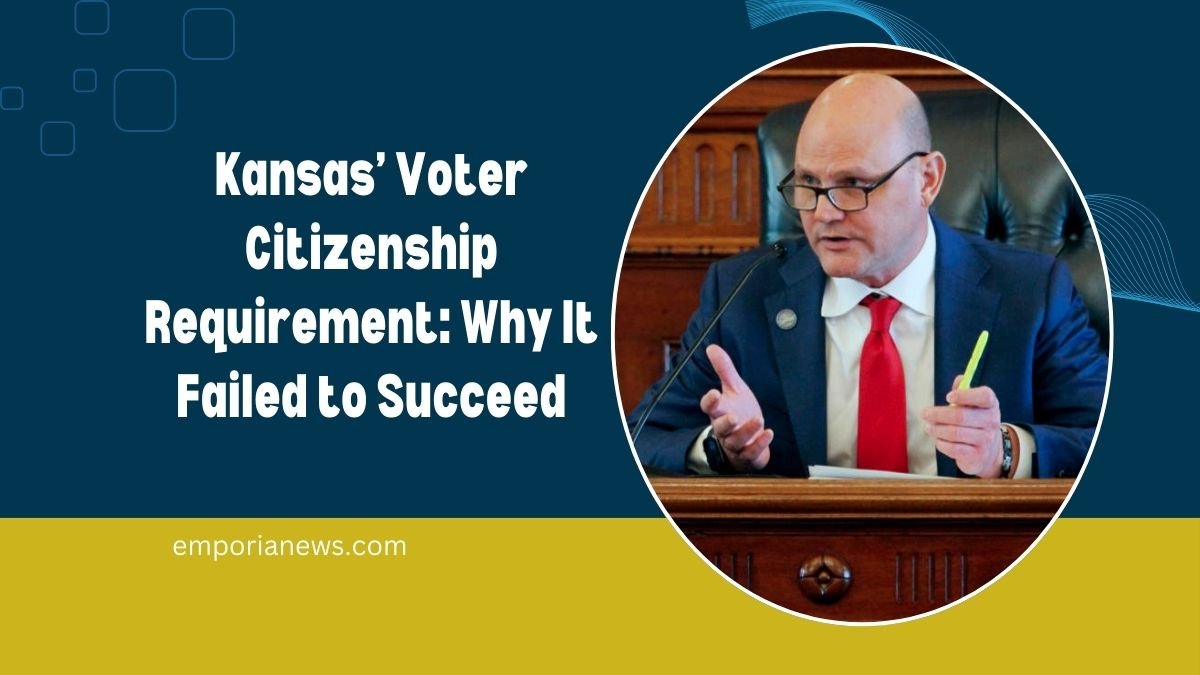TOPEKA, Kan. (AP) — In their 2024 campaign strategy, Republicans emphasized allegations of illegal voting by noncitizens, proposing legislation that would mandate voters to prove U.S. citizenship. Despite their fervor, Kansas—a state with a strong Republican majority—remains hesitant to revisit such policies due to past controversies.
Kansas: A Failed Experiment in Proof-of-Citizenship Laws
Over a decade ago, Kansas implemented a law requiring proof of citizenship to register to vote, sparking one of the state’s most contentious political debacles. Passed in 2011 and enforced by 2013, the law resulted in more than 31,000 eligible U.S. citizens being denied voter registration—representing 12% of first-time registrants. Federal courts ultimately deemed the law unconstitutional, citing its excessive burden on voting rights. Enforcement ceased in 2018.
According to Secretary of State Scott Schwab, a Republican who previously supported the law, Kansas’ experience serves as a warning against pursuing similar measures. “Kansas tried that 10 years ago,” Schwab remarked. “It didn’t work out so well.”
The Broader Debate on Proof-of-Citizenship
While Kansas has backed away, other states and national leaders continue to advocate for proof-of-citizenship laws:
- Arizona recently enacted a law requiring proof of citizenship for state and local elections, though not for federal offices.
- Ohio updated poll worker procedures to demand naturalization papers from foreign-born voters casting regular ballots.
- Symbolic constitutional amendments emphasizing U.S. citizenship in voting were approved in states like Iowa, Missouri, and South Carolina, though these changes do not alter eligibility requirements.
Critics argue that these measures address an issue that is exceedingly rare. Noncitizens must already attest to their citizenship during voter registration, with harsh penalties—fines, imprisonment, and deportation—for fraudulent claims.
Why Kansas’ Law Was Overturned
Federal courts struck down Kansas’ proof-of-citizenship law for exceeding the minimum information required to verify voter eligibility. Evidence showed that from 1999 to 2012, only 39 noncitizens registered to vote in Kansas, averaging just three cases per year. This negligible figure did not justify blocking tens of thousands of eligible voters.
Kris Kobach, the law’s architect and former Kansas Secretary of State, continues to support the policy, arguing that advancements in technology could streamline citizenship verification. However, voting rights advocates remain skeptical, citing the Kansas case as a blueprint for future legal challenges.
Challenges for Voters: A Case Study
Steven Fish, a Kansas warehouse worker, encountered significant hurdles under the proof-of-citizenship law. In 2014, when he attempted to register to vote, his copy of a birth certificate was rejected. Born on an Illinois Air Force base that closed decades ago, Fish could not locate the original document. He joined eight other Kansas residents in a lawsuit against the law, which highlighted its disproportionate impact on unaffiliated and young voters.
Many plaintiffs were U.S.-born veterans who provided proof of citizenship but were still denied registration. This underscores the broader issue of accessibility—millions of Americans lack passports or immediate access to birth certificates, making such laws a barrier for lawful voters.
Key Statistics on Kansas’ Proof-of-Citizenship Law
| Statistic | Figure |
|---|---|
| Total blocked voter registrations | 31,000+ |
| Percentage of first-time registrants | 12% |
| Noncitizens registered (1999–2012) | 39 |
| Percentage of blocked unaffiliated voters | 57% |
| Percentage of blocked voters under 30 | 40% |
Ongoing Advocacy and Resistance
Despite its controversial history, some Republicans believe modern technology could address past inefficiencies. Former Kansas Attorney General Derek Schmidt suggests a different outcome might occur if the law were reintroduced today. However, voting rights advocates remain confident in their ability to mount successful legal challenges.
Mark Johnson, an attorney who opposed the Kansas law, stated, “We now have the playbook for fighting such cases.” Meanwhile, organizations like the Voting Rights Lab warn that proof-of-citizenship laws risk disenfranchising large segments of the population, regardless of administrative improvements.
FAQs
Why was Kansas’ proof-of-citizenship law struck down?
Federal courts ruled it unconstitutional for creating undue burdens on eligible voters while addressing an issue with negligible instances of voter fraud.
Are proof-of-citizenship laws necessary to prevent illegal voting?
Evidence suggests that illegal voting by noncitizens is extremely rare. Existing laws already penalize fraudulent registration and voting.
What were the main impacts of Kansas law?
The law disproportionately affected young and unaffiliated voters, with thousands denied registration despite being U.S. citizens.




